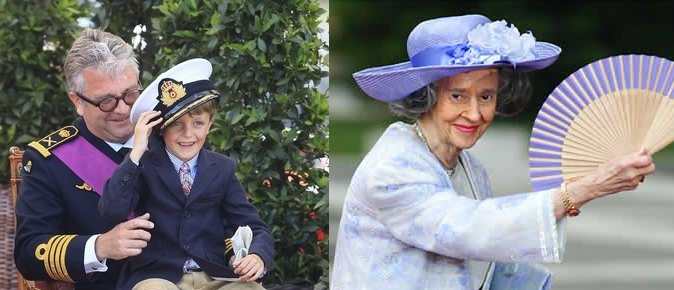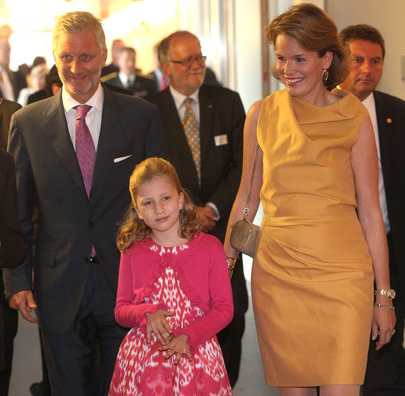“I'd be failing to my duties and my own conception of the royal function if I'd wish to keep on exercising whatever the cost, without being completely fit to assume my role.”
Those were the words [fr] used by Albert II, King of the Belgians, to announce on Tuesday July 3, 2013 his intention to abdicate —as Queen Beatrix of Netherlands did last April— in favour of his 53-year old son Philippe, due to his age and delicate health. In fact, King Albert will be 80 years old in 2014, as he said in his speech [fr], an age “never reached by my predecessors on the exercise of their function,” and has undergone multiple surgical procedures [fr], among them, a quadruple coronary bypass on April 2000.
The background well-known to everybody, however, is a monarchy punised by scandals and very much needed of an urgent renovation. Delphine Boël, King Albert's illegitimate daughter, filed last June 17 before a Brussels court a paternity test [es], bringing to bear once again a case where the Belgian Royal House has shown an attitude seen by much as anachronisitic [fr]. Belgian people haven't forgotten that in 2007, Prince Lorenz, the king's youngest child, was involved in a embezzlement case of Navy funds [es], part of which were used to furnish his new house, or his non-authorized trip to Republic of the Congo [es], that almost caused him to lose his official assignement.
But what seemed to be the last straw has been the last tax scandal, taken on by his sister in law Fabiola. Fabiola, of Spanish origin, is the widow of King Baudouin I, Albert's brother and his predecessor in the throne, who died suddenly in 1993. Widow Queen Fabiola set up a private foundation [es] aiming that, upon her death, her heirs coud elude 70% of succession taxes. Apparently, the official amount perceived from public funds was included in this foundation, thus leading the Belgian government to reduce that amount.

Left, Prince Lorenz of Belgium with his son. Right, widow Queen Fabiola. Photos from the blog The Royalty Chronicles and the forum Noblesse et Royautés.
The Belgian monarchy is one of the few unifying issues in a relatively new country (less than 200 years) where the communities of majority, Flemish and Walloon, grow apart day by day due to Flanders independence aspirations [es]. Under these circumstances, doubts about Prince Philippe's leadership skills intensify. On September 28, 2012, Belgian paper Le Soir published an interview with Martin Buxant [fr], journalist and author of the book “Belgium, a King Without a Country.” When asked if Prince Philippe is ready to become king, he answered:
(…) la quarantaine de responsables politiques, économiques, culturels, diplomatiques que nous avions rencontrés [ont] énormément de doutes quant à la capacité de Philippe à prendre la succession à court terme d’Albert. (…) Il faut être clair : non, il n’est pas prêt !
(…) the almost forty political, economic, cultural and diplomatic responsibles I've talked to [have] great doubts about Philippe's leadership skills to assume Albert's succession in the short term. (…) We have to be clear: no, he is not ready!
Or as Everett Rummage said on Twitter:

Philippe and Mathilde, future kings of Belgium, with their eldest daughter Elisabeth. Photo by blog Royalty Online
@EverettRummage: no one I knew in Belgium thought much of the King, but consensus was his son is an even bigger idiot.
From France, Marjorie [fr] shared her revolutionary ideas:
je comprends pas la Belgique, moi mon Roi on le décapite !
@MarjorieMarje: [fr]: I don't understand Belgium, I'd behead my king!
In Spain, the abdication by two European kings within few months have unleashed speculations about a possible stepping down by king Juan Carlos in favour of his son Felipe.
Adrián Vidales and Otis B. Driftwood pointed the evident similarities:
@AdriVidales: Parece que el rey de Bélgica va a abdicar por delitos fiscales de parientes y líos de faldas. Se me hace difícil no hacer comparaciones…
@AdriVidales [es]: It seems that King of Belgium will abdicate due to tax offenses by relatives and “women troubles.” It's kind of hard to me not to make comparisons…
@obdriftwood: El rey abdica por un escándalo financiero y otro de adulterio. El de Bélgica, no salten antes de tiempo.
@obdriftwood [es]: The king abdicates because of a financial scandal, and another adultery one. The King of Belgium, just don't jump beforehand.
Gerard Sygranyes imagined a conversation in the Palace of Zarzuela:
@GSugranyes:-Papá, papá, el rey de Bél…
-POR QUÉ NO TE CALLAS??“El rei de Bèlgica abdicarà el 21 juliol”: http://ara.cat/_38923284 [cat]
@GSugranyes [es]: -Dad, dad, the King of Bel…
-WHY DON'T YOU SHUT UP??“The king of Belgium will abdicate on July 21l”: http://ara.cat/_38923284 [cat]
Other Twitter users, as Morenatti, implied some irritation:
@MiguelMorenatti: El rey de Bélgica abdicará hoy, mientras el rey de España sigue pensando que abdicar es una empresa de alquiler de coches.
@MiguelMorenatti [es]: The king of Belgium will abdicate today, while the king of Spain keeps on thinking that abdicate means an auto rental firm [note: abdicate in Spanish is abdicar].
And on Albert Cuesta‘s tweet we can see some impacience shared by many Spaniards:
@albertcuesta: – El rey abdica en favor de su hijo Felipe
– ¡Ya era hora!
– No, el de aquí no. El de Bélgica
– Ah
@albertcuesta[es]: – The king abdicates in favor of his son Philippe
– About time!
– No, not the one from here. The one from Belgium
– Ah
Others think the change should be deeper, as the comment made by trilobites [es] in an article appeared on El País [es]:
Las monarquías Europeas deben darse cuenta que tienen que dejar de parasitar de sus Estados. Abdicar y marcharse a esos paraísos fiscales que tanto visitan. Y no volver.
European monarchies should be aware they have to stop being a parasite of their states. To abdicate and leave for those tax havens they so often visit. And don't come back.
Whatever the case may be, the Belgian people will have to adjust to their new Chief of State, even though in the worst case scenario, the Belgians have shown to be perfectly able to keep on going [es] in worse situations, as it became obvious when, between 2010 and 2011, the country spent 589 days [es] without a government, the longest period known in world history.








2 comments